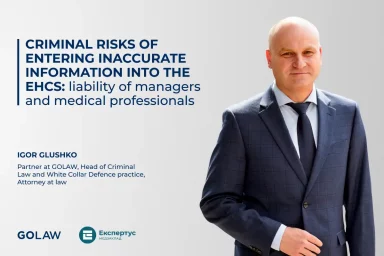The Impact of the Tax Reform on International Business in Ukraine
Contents
The year 2020 was one of fundamental changes in Ukrainian tax legislation directed at bringing it into compliance with the BEPS Plan and best international tax practices. Thus, international business operating in Ukraine shall learn how to work accurately under the new tax rules and avoid attracting negative attention on the part of Ukrainian tax authorities.
This article is about the main tax changes that should be taken into consideration by non-resident companies carrying out their activities in Ukraine.
Definition of the Term “Permanent Establishment”
Significant changes that came into force from 1 January 2021 are related to the definition of the permanent establishment (PE) of a nonresident stated in the Tax Code of Ukraine (TCU). It became boarder and more detailed. According to the new rules the PE, inter alia, includes:
- Ukrainian persons negotiating the essential terms of juristic acts as a result of which the non-resident enters into agreements (contracts) without significant change of such terms and/or entering into agreements (contracts) on behalf of the non-resident. Such activities will constitute a PE if carried out in the interests, at the expense, to the benefit of only one non-resident and/or affiliated persons — non-residents.
- Ukrainian persons which have, and usually exercise, the authority to hold (store) stocks (goods), owned by a non-resident, and from the warehouse of which the supply of stocks (goods) is carried out on behalf of the non-resident, except for residents-holders of temporary storage warehouse or customs warehouse. It is worth noting that such features of a PE are not brand new in taxation. A number of double taxation treaties have already contained similar provisions before their introduction into Ukrainian legislation. Also, the TCU additionally specifies a number of “markers”, which may evidence the performance of the above-mentioned functions by a Ukrainian resident to the benefit of a non-resident. These include the following, respectively:
- provision of mandatory instructions by a non-resident, by e-mail for example, and their implementation by a Ukrainian resident;
- the Ukrainian resident has and uses the e-mail address of the corporate e-mail of the non-resident and/or its affiliates for communication with the non-resident or with the non-resident’s contractors;
- realization by a person of the right to possess or dispose of the stocks (goods) or other assets of a non-resident in Ukraine or their significant part on the basis of the respective non-resident’s instructions;
- the person has the premises leased on his/her/its own behalf for storage of the property purchased at the expense of a non-resident or owned by a non-resident or the third parties, and is to be transferred to the third parties under the non-resident’s instructions or for other purposes defined by the non-resident.
It should be emphasized here that the list of such “markers” is non-exhaustive and the tax authorities are free to use other arguments to prove that certain activities fall under the definition of PE.
Therefore, it is important for non-residents to review their business relations with affiliated companies in Ukraine, other Ukrainian counteragents as to whether or not they may be potentially treated as a PE.
Taxation of Activities of PEs
The amended norms of the TCU set out the new rules of taxation of PEs’ earnings: the PE shall determine the amount of its taxable income in accordance with the arm’s length principle applying transfer pricing methods. This means that the taxable income of a PE shall correspond to the earnings of an independent company carrying out the same (or similar) activities under the same or similar conditions.
Such approach applies to tax (reporting) periods starting from 1 January 2021 and shall be taken into consideration when reporting on such periods.
Registration of Non-residents with Tax Authorities
New TCU rules provide for registration with the Ukrainian tax authorities of those non-residents which carry out their activities in Ukraine through the branch: either commercial or non-commercial representative office. Non-residents which carry out the economic activities in Ukraine by means of a PE shall be registered with the tax authorities as a payer of income tax at the location of the PE. After such registration the non-resident becomes the payer of income tax instead of its PE and is obliged to file tax returns and pay taxes into the Ukrainian budget.
Those non-residents who only have a non-commercial representative office in Ukraine are also obliged to be registered with the Ukrainian tax authorities as taxpayers in general. Such registration will not lead to the obligation to pay income tax.
It should be mentioned here that there are other grounds for the registration of a non-resident with the Ukrainian tax authorities. These include the purchase of real estate or acquisition of property rights to real estate in Ukraine, the opening of banking accounts in Ukrainian banks, acquisition of ownership rights to investment assets (shares of non-residents mainly formed by shares in a Ukrainian legal entity where the latest are mainly formed by Ukrainian real estate) from another non-resident which has no PE in Ukraine.
To this respect, in dependence of the reason of non-resident’s registration with tax authorities, it may be deregistered after closing of representative offices or PEs, alienation of real estate, closing of all accounts in banks of Ukraine, provided that there are no other objects of taxation and objects related to taxation located on the territory of Ukraine.
Therefore, non-residents shall keep in mind that carrying out a number of activities in Ukraine requires registration with the Ukrainian tax authorities.
Tax Audits of Non-Residents
Changes to the TCU provide for carrying out tax audits of non- residents. In the event that the Ukrainian tax authorities suspect that a non-resident is actually conducting economic activity in Ukraine without registration with the respective Ukrainian tax authorities, they may appoint a tax audit of these activities.
Such audits will be carried out under the procedure established by the Ministry of Finance of Ukraine.
In particular, if it is found out within the audit that a non-resident conducts its business activities in Ukraine without tax registration, the tax authorities may draw up a tax audit act and send it directly to the non-resident or hand it over to its representative in Ukraine. Such act will be a ground for the registration of such a non-resident with the Ukrainian tax authorities without the non-resident’s consent, application or any other objections to the tax audit act.
Thus, non-residents shall properly fulfill the requirements of the TCU on registration with the tax authorities so as to minimize the risk of the tax audits described above.
Sale of Shares in Real Estate Rich Companies
Starting from 2021 the indirect sale of Ukrainian real estate through sale of shares in legal entities will be subject to withholding tax (WHT). In particular, new regulations of the TCU directly specify that the income of non-residents earned from the sale of shares in foreign legal entities will be subject to taxation in Ukraine when the following requirements are met at any time during the year preceding the deal:
- the value of shares of a foreign legal entity is formed by 50% or more by shares in a Ukrainian legal entity owned directly or indirectly by such foreign legal entity and
- the value of shares in a Ukrainian legal entity is formed by 50% and more by real estate located in Ukraine and owned by such Ukrainian legal entity or used by it on the basis of an operating or financial lease or via a similar agreement.
Therefore, the sale by a non-resident of shares in another foreign company requires a check as to whether such a foreign company has any relation or not to Ukraine (as mentioned above) for the purposes of taxation.
If this is the case then, as we mentioned above, the non-resident buyer shall register with Ukrainian tax authorities before execution of the deal and pay WHT to the Ukrainian budget from the income of the non-resident seller. What is interesting here is that the seller has the rights to provide documents proving his expenses for the acquisition of the shares.
In such case the WHT will be paid from the investment income of the seller (profit from sale minus expenses for purchase). If the seller does not have such documents or is not willing to provide them, the buyer shall withhold WHT from the actual price of the shares.
Application of Double Taxation Treaties
Several new anti-avoidance rules have been introduced into the TCU preventing companies from abusing the provisions of double taxation treaties. First, to receive the reduced WHT rate under the relevant double taxation treaty, the transaction with the non-resident shall meet the “principal purpose test”. It means that the primary purpose of the respective business transaction of a non-resident with a resident of Ukraine shall not be the mere receipt of taxation benefits. Such transaction shall have an economic effect and be reasonable for the Ukrainian company.
Second, transactions with non-residents which fall under transfer pricing must meet the “sound economic reason” or “business purpose” principle. It shall be deemed that there is no business purpose if the principal purpose of a transaction is non-payment of tax, or if a resident would not enter into such an agreement with a non-related non-resident on the same conditions.
This rule, however, will be modified from 2022, and will also apply to uncontrolled transactions with non-residents registered in low taxation jurisdictions or of special corporate forms (like partnerships) and also uncontrolled operations on royalty payments from Ukraine.
Conclusion
Taking into consideration the large number of new introductions, we recommend that businesses take measures that will help them to avoid fines and potential disputes with the Ukrainian tax authorities. In particular, we suggest conducting an audit of all agreements with non-residents and determining and confirming that such agreements contain a business purpose. As a result of such an audit, it will be possible either to change the structure of a transaction or to determine the correct withholding tax rate. It would also be advisable for non-residents to check their actual presence in Ukraine for PE risks and to either register with the tax authorities or change the actual corporate structure of their business.

Viktoriia Bublichenko
Partner, Head of Tax, Restructuring, Claims and Recoveries practice, Attorney at law
- Contacts
- 31/33 Kniaziv Ostrozkykh St, Zorianyi Business Center, Kyiv, Ukraine, 01010
- v.bublichenko@golaw.ua
- +38 044 581 1220
- Recognitions
- ITR World Tax 2026
- Lexology Index: Corporate Tax 2025
- IFLR 1000 2024
- 50 Leading Law Firms Ukraine 2026
Sign up to be aware
New achievements are inspired by information. GO further, don’t miss out GOLAW news and legal alerts
Our expertise
-
- Energy and Natural Resources
- Antitrust and Competition
- Banking and Finance
- Compliance, Corporate Governance and Risk Management
- Corporate and M&A
- Criminal and White Collar Defence
- Defense in Anti-corruption procedures and regulations
- Digital Economy Practice
- Labor and Employment
- Natural Resources and Environment
- Government Relations (GR)
- Insolvency and Corporate Recovery
- Intellectual property
- International trade
- Legal support of business and private Сlients in Germany
- Litigation and dispute resolution
- Private clients
- Real Estate and Construction
- Restructuring, Claims and Recoveries
- Martial Law
- Tax and Customs
-
- Agribusiness
- Aviation
- Chemical industry
- Engineering, Construction and Building Materials
- Environment and Natural Resources
- Financial institutions
- IT and AI
- Industry and manufacturing
- Healthcare industries, Life sciences and Pharmaceuticals
- Media, Entertainment, Sports and Gambling
- Retail, FMCG and E-Commerce
- Transport and Logistics
We use cookies to improve performance of our website and your user experience.
Cookies policy
Cookies settings







